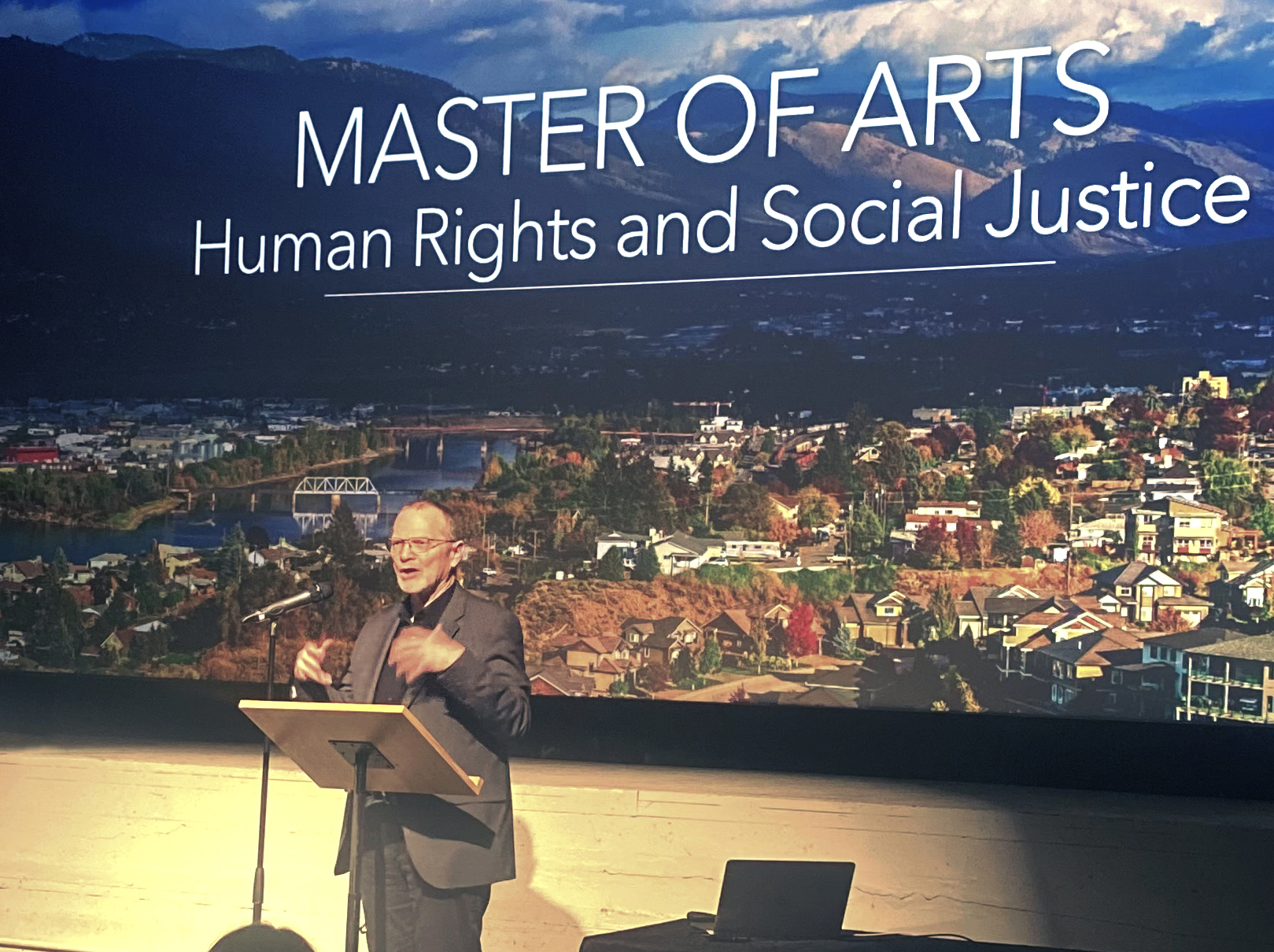When Rick McCutcheon arrived at TRU four years ago as the new dean of arts, he surveyed faculty members about program needs. Based on those conversations, three months later, he had a concept paper written for a Master of Arts in Human Rights and Social Justice program.
Creating a new academic program takes time and numerous reviews before government approval. Three and a half years after McCutcheon first drafted his paper for the provost, the Master of Arts in Human Rights and Social Justice is a reality. The first cohort of up to 30 students begins this fall.
“That’s pretty fast. It shows how well received it was by internal bodies and external reviewers across the country who were involved,” he says.

TRU Dean of Arts Rick McCutcheon talks about the new Master of Arts in Human Rights and Social Justice program at the recent Little Lectures, Big Ideas event.
The 16-month program, which is unique in that it marries social justice and human rights rather than teaching them separately, includes four core courses that include Indigenous ways of knowing and a requirement to do hands-on field study work.
“This is the only program of this form in Western Canada that has this kind of blending of human rights and social justice, so students come out with a well-rounded master’s degree. We see this as very unique in BC and in Canada,” McCutcheon says.
Students will examine such issues as homelessness, truth and reconciliation, poverty, climate change, conflict resolution and war. Graduates will come out prepared to work for non-government organizations, a range of civil-service units in government, businesses that practice corporate social responsibility and a host of other organizations, he said. This program will also prepare students for further studies at the doctoral level if that is their path.
“It’s a program for practical people who want to make a difference in the world. It’s a program that focuses on providing real skills to help people understand complex issues in the real world,” says McCutcheon.
“This new program is a natural for TRU, as it aligns perfectly with our vision and mission and what kind of institution we want to be. A program like this intends to make differences in people’s lives,” says TRU President Brett Fairbairn.
“TRU is the kind of post-secondary institution that envisions having social impact, and I am certain the first class of graduates from this program, as well as all who will follow in the years to come, will make our communities and our world better. I am proud to see TRU leading the way with this kind of program.”
Collaborating with the city
McCutcheon says the program will benefit the city of Kamloops as students engage with the field experience part of the program, which will often take place in the city.
“This is a timely graduate program for this institution and for the city. The relationships between Indigenous and non-Indigenous people, for example, needs to be addressed in the context of the discovery of undocumented graves and the Truth and Reconciliation Commission calls to action. With the environmental crisis—the wildfires and flooding—clearly this is going to raise a lot of justice issues. People are affected differently by flooding; if you’re wealthy, there’s one experience; if you’re not, there’s another,” he says.
Students choose one of four ways to complete their degrees: course based, thesis based, project based or through a creative expression pathway that can involve film, documentary or other forms of fine arts.
“The timeliness of this is very important for this kind of program. It will have a dramatic impact on campus to have us constantly thinking about these issues. By encouraging inquiry into the connections between human rights and social justice at the local and regional level, this new graduate program also will have a positive impact on our community.”
“By introducing a justice and community focused program, it’s clear that TRU is focused on engaging graduate students in social issues and Indigenous ways of knowing, with on-the-ground real-life impacts,” says Anne Kang, Minister of Advanced Education and Skills Training. “I’d like to acknowledge the good work by TRU for moving forward with opportunities for students to share their knowledge in helping create communities that are culturally safe.”

